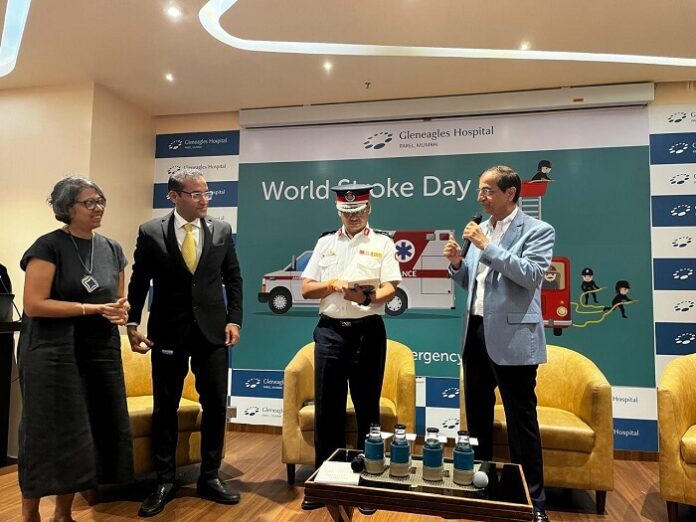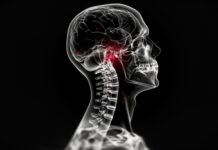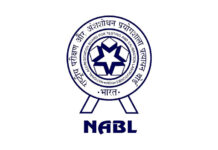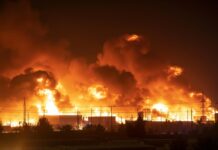

In observance of World Stroke Day on October 29th, Gleneagles Hospitals in Parel, Mumbai, has launched an impactful awareness campaign titled “Fire in the Brain.” Drawing a strong analogy between fire emergencies in the city and stroke emergencies in the brain, the campaign emphasizes the need for immediate response in both situations. The campaign slogan, “Fire in the City—Call the Fire Brigade; Fire in the Brain—Call the Right Doctor,” aims to educate the public on the critical importance of timely intervention for stroke. Attending the launch event were Mr. Rajendra Ambulgekar, Chief Fire Officer of Mumbai, Dr. Bipin Chevale, CEO of Gleneagles Hospital, Dr. Shirish Hastak, Director of Neurology and Stroke, along with other hospital team members and Mumbai fire personnel. Risk assessment tools, or “riskometers,” were distributed to firemen, enabling them to evaluate their own stroke risk. During the event, the fire chief also recognized five stroke survivors, highlighting the significance of prompt treatment and the value of going to a specialized hospital or stroke center.
Around 100 million people worldwide live with the effects of stroke, a serious medical emergency where quick action can make the difference between life and death, or between full recovery and long-term disability. “Ninety percent of strokes are linked to 10 major modifiable risk factors such as high blood pressure, diabetes, high cholesterol, smoking, physical inactivity, diet, alcohol consumption, obesity, and stress. Only 18% of low-income countries have access to critical stroke treatments, in contrast to 91% in high-income countries. Greater efforts are needed to ensure people everywhere can receive necessary care during a stroke emergency. Recognizing stroke signs early and seeking immediate medical care is crucial,” shared Dr. Shirish Hastak, Regional Director of Neurology, Stroke, and Neurocritical Care at Gleneagles Hospital, Parel. He also emphasized the importance of the “BEFAST” acronym (Balance, Eyes, Face drooping, Arm weakness, Speech difficulty, and Time) for recognizing stroke symptoms and acting quickly.
As per the press release, Dr. Hastak further explained, “Like a fire, every second counts in a stroke emergency. Highlighting the similarities between these time-critical situations, our campaign includes the participation of the local fire department to raise awareness of both stroke and fire emergencies. Both situations require swift, decisive action. By partnering with the fire department, we aim to strengthen the message that recognizing stroke symptoms and getting immediate medical help is just as essential as calling the fire brigade in a fire emergency. Firefighters respond quickly to save buildings, just as neurologists must act quickly to save brain function. Reaching a stroke-ready hospital or specialized center in time can protect brain function and save lives. The riskometers distributed will allow firemen to assess their stroke risk, encouraging them to monitor factors like blood pressure, cholesterol, and lifestyle choices. Remember: ‘Time is Brain’—stay vigilant about your health.”
“We are proud to support this innovative initiative led by Gleneagles Hospitals, a leader in healthcare. The campaign has received tremendous response, and we look forward to future collaborations,” stated Mr. Rajendra Ambulgekar, Chief Fire Officer, Mumbai Fire Brigade. “In emergencies, everyone calls the fire department for fires at home or in buildings. In the case of a stroke, calling a stroke-ready hospital can reduce the risk of lifelong disability and improve patient outcomes.”
The World Stroke Day awareness event brought together firefighters, healthcare professionals, and stroke survivors to inform the public about stroke prevention, recognition, and treatment. “At Gleneagles Hospital, we’re dedicated to providing the highest level of stroke care to our community, with the expertise and advanced treatments needed to diagnose and treat strokes quickly, giving patients the best chance at a full recovery. This partnership empowers the community to respond promptly to stroke emergencies, just as they would in the case of a fire,” concluded Dr. Bipin Chevale, CEO of Gleneagles Hospitals, Parel, Mumbai.























